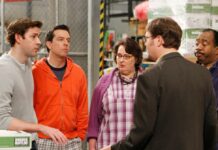Ethan Hawke is an actor, writer and director, star of the films Dead Poets Society, Training Day and Boyhood. He has been nominated for Academy Awards for his acting, and for his writing on Before Sunset and Before Midnight. Hawke describes theatre as his first love and has featured in a number of plays by Sam Shepard, as well as in productions of work by Shakespeare, Chekhov, and his own second cousin twice-removed, Tennessee Williams.
Hawke’s first novel, The Hottest State, was published in 1996. His second, Ash Wednesday, came out in 2002. Now, with A Bright Ray of Darkness, Hawke brings us a novel that is structured around a stage production of Henry IV, Part 1. The book’s narrator, William Harding, is a hard-drinking film star who seeks to overcome a period of personal turmoil by throwing himself into his role as Henry Percy.
Hawke lives in Brooklyn with his wife and two daughters. He has two older children by a previous marriage.
Did you ever think how your life might have turned out if you’d committed yourself fully to books?
One of the strange things about turning 50 is that you do feel that the path has been carved. There’s a lot of road behind you. To my shock, here I stand at 50 as a really young novelist. I’m a really old actor – I know all the tricks. My life as a writer is touching base with a much younger me. When I was younger, I was really passionate about writing. What’s beautiful about writing is that it’s something you can be in charge of. When I’m acting, I can be on a film set with Paweł Pawlikowski or in a rehearsal room with Sam Shepard. Now, that’s rewarding. But the rest of it – auditions, the hyperbole of celebrity – all that’s a big fat bore and leads most people to a pretty frivolous life. My goal was never to be Tom Cruise.
This book seems to play games with the divide between the narrator’s life and your own. Was that intentional?
When I wrote Ash Wednesday it was my attempt to prove that I wasn’t a dilettante. I was thrown by the reaction to the book. Critics were always trying to break down the scaffolding I put up, and ask “Where is the actor here?” I met a German publisher on my book tour back then who told me: “If you want to write a serious novel you have to run into acting, not away from it. At the moment you’re just a famous person who writes. You’re not a famous writer. To do that you have to stare down the demon that’s in your way.” So I got on the plane back from Germany and the idea came to me in a flash. But then 20 years went by. Had my acting career not been as rewarding as it turned out to be, I’d have got around to this much sooner.
It’s a book in which sex is described regularly and frankly. [The protagonist has a relationship with a much younger woman.] Did you find this difficult in the current environment?
Our sexual identity and the relationship we have through it, to ourselves and to others, is defining in our lives. And in the light of cancel culture and shaming – while a lot of this moment is very helpful – it’s a difficult time to say: “I want to be open about the idiosyncrasies of human sexuality.” What’s that great Mark Twain line? “The aim of art is to alleviate shame.” We’re in this period now when you can’t even write about bad behaviour because it might seem like you’re condoning it. You have to be able to create a character who does things they wish they didn’t do. I went back and forth on it, because it’s just a petrifying time to speak about male sexuality. If you can’t shine a light into dark corners, the demons that live there will never go away.
How do you respond to bad reviews of your novels?
I can take bad reviews as a writer, because if critics don’t like it then really they just don’t like the way my brain works, and I’m OK with that. I meet people in restaurants that hate me. And 70 million people voted for Trump. There’s no accounting for taste.
Who’s your favourite living writer?
I guess because we feel ourselves in a moment of history, Doris Kearns Goodwin jumps to mind. I’ve gained so much knowledge from her research into the history of American presidents. Her book No Ordinary Time about Franklin and Eleanor [Roosevelt] is extremely inspiring.
How are your books organised?
Really poorly. It is a source of much trouble to me. When I was younger I had a bookcase full of the books I liked – James Baldwin and Salinger and Mark Twain. I have grownup kids now, I have a 19-year-old and a 22-year-old who are reading, and they steal all my books and I can’t find anything. If I had a magic elf I’d have them rearrange everything alphabetically.
How did lockdown change your reading habits?
My reading habits have been demolished by an acting career and children. If we were best friends, the thing I’d confess to you, a thing that really hurts, is how few books I read. And it has decreased in recent years, because I have so many scripts that people want me to read. Every time I want to open up a novel, I’m haunted by the fact that I haven’t read those four scripts that my friends sent me. So lockdown has enabled me to do some reading for pleasure.
What book would you give to a 10-year-old?
Randall Jarrell’s The Animal Family. I don’t know if it’s in print any more. That book floored me. My kids are at various different ages, and I’d read it to my older kids 10 years ago, but the first thing we did when the pandemic happened was we all sat around, I lit a fire and my wife read it to all of us. It was so wonderful.
• A Bright Ray of Darkness is published by Cornerstone (£16.99). To order a copy go to guardianbookshop.com. Delivery charges may apply
• A Night in With Ethan Hawke will be streamed globally from the Southbank Centre, London, on 8 February; tickets are on sale now








